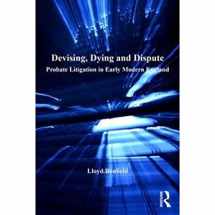
Devising, Dying and Dispute: Probate Litigation in Early Modern England
Book details
Summary
Description
Seventeenth-century England was a country obsessed with property rights. For only those who owned property were considered to have a vested interest in the maintenance of law, order and social harmony. As such, establishing the ownership of 'things' was a constant concern for all people, and nowhere is this more evident than in the cases of disputed wills. Based on a wealth of surviving evidence from the Prerogative Court of Canterbury, the probate jurisdiction which probated wills of the more wealthy English property owners as well as some of those with a more modest quantity of property, this book investigates what litigation over the validity of wills reveals about the interplay between society and law. The volume investigates, catalogs, and systematizes the legal issues that were raised in will disputes in the Canterbury Court in the last half of the seventeenth century. However, this is not just a book about law and legal practice. The records from which it draws plunge us into deeply personal and often tragic situations, revealing how the last requests of the dead and dying were often ignored or misinterpreted by family, friends and creditors for their own benefit. By focusing on property law as reflected in cases of disputed wills, the book provides a glimpse at a much fuller spectrum of society than is often the case. Even people of relatively modest means were concerned to pass on their possessions, and their cases provide a snapshot of the type of objects owned and social relationships revealed by patterns of bequests. This too is true for women, who despite being denied full participation in many areas of civic life, are frequently encountered as key players in court cases over disputed wills. What emerges from this study is a picture of a society for which notions of law and private property were increasingly intertwined, yet in which courts were less concerned with formality than with ensuring that the intentions of will-makers were properly carried out.


We would LOVE it if you could help us and other readers by reviewing the book
Book review



